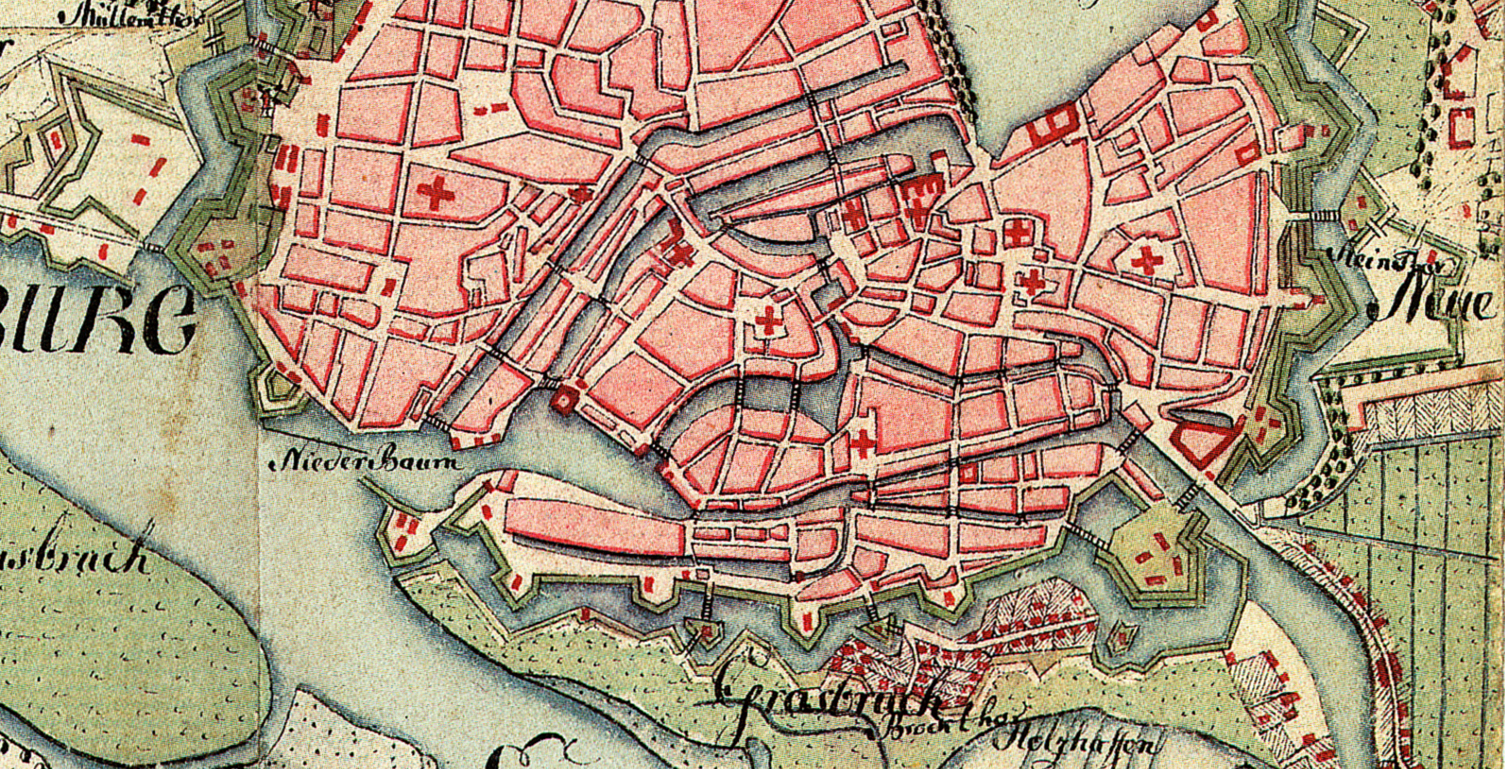Altona (1750–1800): notions of privacy at the interface between civic ideals and practices

Eighteenth-Century Altona was a German-speaking city belonging to the Danish Monarchy, located on the river Elbe, in the southernmost fringe of the Danish Realm. The town formed an essential part of the economic strategies of the Danish Crown, and already in 1664, the city was granted city privileges, which included extensive commercial and customs privileges and a far-reaching freedom-of-religion aimed explicitly at attracting merchants from all over Europe. Consequently, throughout the eighteenth century, Altona served as a hub for Enlightenment ideas, religious dissent, and commercial interest and offered its inhabitants codified freedoms of trade, tolls, and religion.
The starting point of our period marks the beginning of an intensive regulation of outer and inner borders of an, until then, fairly unregulated city. Our investigation of the city takes a different approach than most Danish and German research, which has predominantly dealt with agents and ideas coming from Altona but has shown scarce interest for the city itself.
The Altona case revolves around the city's police director Johann Peter Willebrand (1719–1786), his many theoretical works about 'good police' in the expanding city, most importantly Abrégé de la Police (1765, Hamburg: Estienne et Fils), and his practical service in Altona as he was writing and reflecting on the ideal urban regulation. Willebrand's writings and his efforts to implement his ideals offer perspectives on cultural history, urban infrastructure and architecture, cameralistic thought, and implementation of police regulation.
In relation to Willebrand's theoretical works, the case team draws significantly from archival sources preserved in the Landesarchiv Schleswig-Holstein and the Danish National Archives. These sources include city governance, burgher patrols, the midwife school, religious dissenters and minorities, townsmen's petitions to Copenhagen, and correspondence between the municipal authorities in Altona and the central administration in Copenhagen.
Activities and presentations
- Johannes Ljungberg, “Sabbath Crimes in the Enlightenment City. Religious and commercial (dis)order in mid eighteenth-century Altona”, The Nordic History Summit, 08.08.2022
- Jesper Jakobsen, Johannes Ljungberg, “Politikontoret i grænsebyen Altona 1750–1800”, The Interdisciplinary Eighteenth-Century Seminar at the University of Copenhagen, 16.05.2022.
- Jesper Jakobsen: “Regulating urban noise. Notions of disruptive sound and privacy in early modern Altona, c. 1750-1800”. Paper presentation at Sound, Privacy and Court Studies. An Interdisciplinary Workshop, Centre for Privacy Studies and Rosenborg Castle. 25.06.2021.
- Johannes Ljungberg, Jesper Jakobsen & Natacha Klein Käfer: “Bodies, brothels and borders: Private matters in eighteenth-century Altona”. Invited presentation at the Higher Seminar, Department of History at Lund University, 11.05.2021.
- Natália da Silva Perez: “Regulating Life in Private and in Public for the Portuguese Nation”, paper presented at the conference “Atlantic Jewish Worlds 1500-1900, organized by the McNeil Center for Early American Studies in partnership with the Herbert D. Katz Center for Advanced Judaic Studies at the University of Pennsylvania, 7–8.04.2021.
- ·Seminar with Susanne Rau (Universität Erfurt), arranged by Johannes Ljungberg & Natacha Klein Käfer: "Altona, 'little sister' of Hamburg: urbanisation, religious freedom and the emergence of privacy", including a presentation by Johannes Ljungberg & Jesper Jakobsen: “Regulating the unregulated city. Defining and negotiating private property and notions of privacy in Altona, 1740-1770”, 17.12.2020.
- Johannes Ljungberg & Jesper Jakobsen: “Privacy och det privata i tidigmoderna städer: Fallstudien Altona 1750-1800”. Presentation at the Early Modern Seminar, University of Stockholm, Stockholm University. 09.12.2020.
- Johannes Ljungberg, “Receiving and controlling strangers in private houses in mid eighteenth-century Altona”, Presentation at conference Baltic Hospitality: Receiving Strangers/Providing Security on the Baltic Sea Coasts, c. 1000–1900, Södertörn University, 01.12.2020.
- Johannes Ljungberg, “Sabbath Crimes in the Enlightenment city: Struggles for Establishing a Godly Order in Eighteenth-Century Altona”. Paper presentation at the conference Enlightenment confessionalised: The Nordic countries in the long eighteenth century, Ystad Saltsjöbad, 13.10.2020.
- Session at the Dansk Historikermøde 2020: “Private and Public life in eighteenth-century Altona”, organized by Jesper Jakobsen. With paper presentations by: Natália da Silva Perez, Frederik Stjernfelt, Jesper Jakobsen, and Johannes Ljungberg, 24-26.08.2020 (cancelled due to Covid-19).
- Jesper Jakobsen, Natacha Klein Käfer, Johannes Ljungberg & Lars Cyril Nørgaard: “Notions of privacy in Altona 1750-1800”. Presentation at Saxo Instituttets 1700-talsseminarer (The Saxo Institute’s seminars on the 18th century), 12.05.2020 (cancelled due to Covid-19).
Published publications
- Johannes Ljungberg, 'Between home and city. Receiving and controlling strangers in Altona, 1740–1765', in: Baltic hospitality: Receiving strangers/providing security on the Baltic Sea coasts, c. 1000–1900, ed. by S. Nauman, W. Jezierski, C.Reimann, and L. Runefelt, Bloomsbury, 2022, 247-271, 25 p.
Forthcoming publications
- Johannes Ljungberg, 'Sabbath crimes in a city of enlightenment. Religious and commercial (dis)order in mid-eighteenth-century Altona', in: Religious enlightenment in the Nordic countries during the long eighteenth century. Reason and orthodoxy. Manchester University Press, 2023, 312-340, 29 p.
- Johannes Ljungberg & Jesper Jakobsen, 'The establishment of the police office in eighteenth-century Altona. New opportunities for privacy in transitional times?', Urban history, 2023
Publications currently in peer-review
- Jesper Jakobsen, 'Be quiet! Johann Peter Willebrand on Urban Noise and the Importance of Domestic Tranquillity in Eighteenth-Century Altona'
Members
Jesper Jakobsen (former member) , Natacha Klein Käfer and Johannes Ljungberg.
